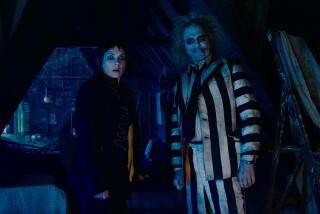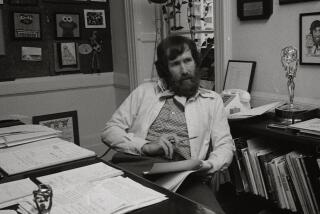Bugs Bunny, role model with a cottontail
- Share via
Some cinematic rules are iron-clad: The man in the white hat wins the shootout, brunets are smarter than blonds, and Bugs Bunny always, always emerges triumphant. No matter the circumstances, no matter the opponent, Bugs is unruffled, chomping on his ever-present carrot like a cigar, another bon mot at the ready. As Chuck Jones observed of his most famous creation, “We are all of us Daffy, Elmer and Wile E. Coyote. We just wish we were Bugs.”
FOR THE RECORD:
Bugs Bunny DVDs: An article in the Oct. 12 Calendar section about two new DVDs featuring Bugs Bunny cartoons gave the wrong first name for one of the directors of those works. He was Bob McKimson, not Bill. —
Now, two new DVD collections of Bugs’ best work, “Bugs Bunny: Hare Extraordinaire” and “The Essential Bugs Bunny,” have been issued by Warner Home Video to remind viewers — who might have forgotten about his charms or carelessly classified him as a mere childish pleasure — of what the wascally wabbit could accomplish. “Hare Extraordinaire” features 15 previously unreleased-on-DVD Bugs shorts, and “The Essential Bugs Bunny” is a capacious two-disc set, with 12 original shorts joined by television specials such as “How Bugs Bunny Won the West” and a tribute documentary, “Ain’t He a Stinker.”
Warner Bros., which has been disappointingly slow in converting its magnificent trove of animated shorts to DVD, has at least been diligent in paying homage to its greatest creation. Bugs is an amalgam of classic Hollywood’s most notable stars. Borrowing Charlie Chaplin’s physical grace, Humphrey Bogart’s swagger (Bugs’ catchphrase, “What’s up, doc?,” feels like something Bogey might have uttered in some forgotten 1940s crime picture) and James Cagney’s Brooklyn accent, Bugs was a cartoon animal elevated to heroic proportions.
With his verbal dexterity and physical ingenuity, Bugs was, like Chaplin’s Tramp, infinitely capable, thriving under the most adverse of circumstances. He is the polar opposite of Warners’ other animated hero, Daffy Duck, perpetually drenched in the flop sweat of presumed failure. “Everybody knows that stupid rabbit’s gonna win!” Daffy shouts dejectedly at a sportsman’s award dinner in “Bugs Bunny’s Wild World of Sports.” “He always wins!” (Bugs eventually wins here too.)
Watch enough Bugs Bunny shorts, and certain characteristics of the hare come to the forefront. He is blessed with the gift of gab, capable of twisting and inverting language to bend opponents to his will. Bugs is gloriously, triumphantly impudent; on meeting the great man in “Napoleon Bunny-Part,” he fiddles with the French emperor’s toy soldiers, disrupting his plans for the conquest of Europe, and shouting, “Hey, Nappy, this has got Scrabble beat a mile!”
If Napoleon fares poorly, Bugs’ eternal jousting partners Yosemite Sam and Elmer Fudd are even worse off, perpetually foiled in their plans to triumph over the bunny.
Bugs is also surprisingly sexually indeterminate. Bugs Bunny has no problem with cross-dressing; at times, he seems more comfortable in women’s garb than in his own skin. He poses as a Tasmanian she-devil in “Bedevilled Rabbit,” is a new mother graced by the stork in “Apes of Wrath” and dons a golden breastplate to play Brünnhilde in the Wagnerian “What’s Opera, Doc?” The gender-bending speaks less to an unresolved identity crisis than to Bugs Bunny’s near-magical ability to take on other personae at will.
As his turn as Brünnhilde might indicate, Bugs Bunny is a self-aware showman, and his star vehicles are often burlesques of familiar material. The likes of “Casablanca,” “Mutiny on the Bounty” and “The Barber of Seville” are co-opted for Bugs’ purposes.
At his best — in “Baseball Bugs,” say, in which he channels the one-man-band spirit of Buster Keaton’s “The Playhouse,” or “Rabbit of Seville” — Bugs’ powers of invention are unmatched. At the same time, what makes Bugs Bunny so memorable is his air of sardonic dismissal, as if all his unparalleled magic were only the merest fluff from his collar. Bugs is perpetually unimpressed with what the world throws at him, and it is that unruffled quality that is the most joyous amusement he can offer. Bugs Bunny wows us by never being wowed himself.
Bugs was Everyman (and occasionally Everywoman), but he was Everyman viewed in a particularly flattering mirror, being wiser, craftier, funnier and more energetic than any of us have any particular claim to be. Bugs is so vivid a character, in fact, that one might forget he was the product of a small coterie of men working under the Warner Bros. umbrella, among them directors Chuck Jones, Friz Freleng, Bill McKimson and Tex Avery, and Bugs’ voice, Mel Blanc. Together, they built Bugs from his initial appearance in 1940’s “Elmer’s Candid Camera,” in which he more resembles a generic rabbit than himself, to the wised-up rebel with the Brooklyn accent and the big-city polish.
Bugs’ capacious imagination is their own, and his physical indomitability is their own fantasy writ large. In dreaming of a larger-than-life bunny, they allowed us too the pleasure of dreaming we could be Bugs Bunny.


